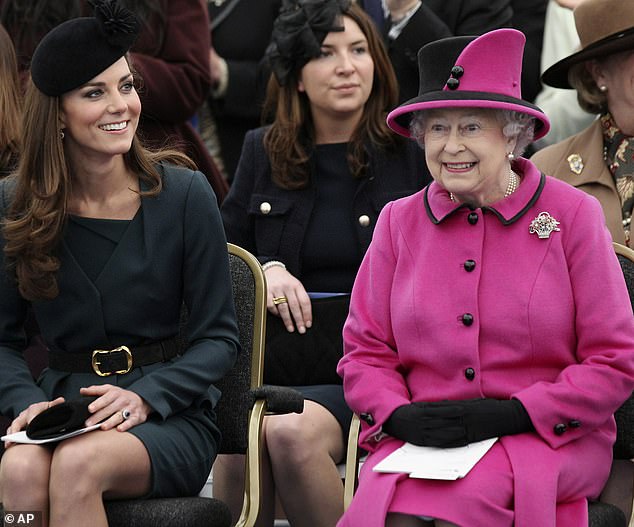LIZ JONES: Kate is popular not just because she always looks perfect… but because she refuses to be a victim. She’s starting to eclipse the other Princess of Wales
It was a startling statement, perhaps rash – reminiscent of John Lennon’s famous statement that the Beatles were more popular than Jesus.
Speaking on The Reaction, the Mail’s current affairs talk show, presenter and columnist Sarah Vine dared to say the sacrilegiously unspeakable:
‘I think the Princess of Wales is fast becoming as popular, if not more popular, than the other Princess of Wales.’
Yes!
As a loyal Diana lover, I was immediately outraged.
I had always loved and admired Diana because, however perverse, she seemed humble – one of us despite aristocratic birthright.
The way she looked at the camera, or nervously stroked her hair before a big, boring formal dinner.
I have always loved and admired Diana because, however perverse, she seemed humble – one of us despite aristocratic birthright, writes Liz Jones

Catherine possesses the quiet dignity of those like the late Queen Elizabeth who were fired in the furnace of wartime, a steely stoicism that seemed to skip a few generations
Diana made mistakes – we all do – and not just with her see-through skirts, but also by wearing black when she wasn’t at a funeral (not done for a royal) or showing way too much cleavage in yet another… a voluminous Emanuel dress.
Diana’s Emanuel’s wedding dress was hopelessly wrinkled and her choice of husband was downright disastrous. What woman wouldn’t sympathize with it?
As she opened up about her struggles, Diana helped usher in an era of MeToo, the baring of souls, the tell-all memoir, the unstoppable trend toward wellness.
For some of us she was a gift from heaven.
Thanks to Diana, having an eating disorder was not something to be ashamed or secretive about.
By being honest about suicidal thoughts, her depression and self-harm helped many a teenage girl shivering in a bedroom no longer feel alone.
A turbulent, far from perfect private life naturally sold newspapers and magazines, and throughout Diana’s reign as Queen of Chaos I too wrote about her.
My very first Shy Di assignment for Company magazine was to track down other 19-year-old brides who were getting married on that same day, July 29, 1981.
This led to writing about my own depression, my eating disorder, and the collapse of my own marriage.
Diana was a lucrative, if broken, mirror to so many of our lives, which means we clung to her – and still do.
If a beautiful princess could be so desperately unhappy, then we all felt less lonely, less guilty.

Speaking on The Reaction, the Mail’s current chat show, presenter and columnist Sarah Vine dared to say the sacrilegiously unspeakable: ‘I think the Princess of Wales is quickly becoming as popular, if not more popular, than the other Princess of Wales.’
But the world has moved on.
And the reason I believe Catherine now tops a recent YouGov survey of the most popular Royals – even surpassing William and Charles – is that she personifies a more modern, confident ideal of femininity.
Catherine refuses to be a victim. She will not allow herself to be thrown into the choppy waters of whatever fate befalls her.
It’s notable that Anne, the Princess Royal, is third in the YouGov rankings, another woman who refuses to whine or whine or collapse under the weight of self-pity.
Catherine is popular not only because she never wrinkles or gets caught wearing the wrong thing, but also because she is strong.
Even when she told the world about her cancer diagnosis, there was no trace of Poor Me, no hysteria, no man by her side to hold her up.
She knew that if she had broken down, we would have done the same.
Catherine possesses the quiet dignity of those like the late Queen Elizabeth who were dismissed in the furnace of wartime, a steely stoicism that seemed to skip a few generations.
I can’t imagine Kate barking about menopause when her time comes.
So, reluctantly, I agree with Sarah Vine. There is dignity and strength in getting on with life. Putting the needs of others first.
Diana fulfilled a need: she opened the floodgates.
Catherine’s role today is to end them quietly and serenely.
